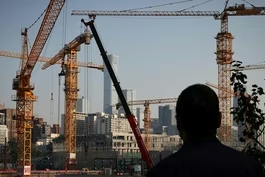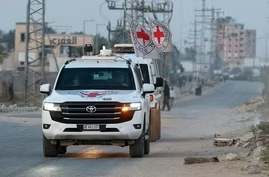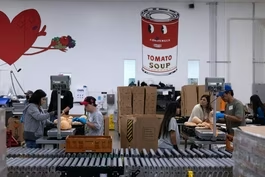
Climate change threatens ancient Socotra dragon’s blood tree
Clip: 11/1/2025 | 5m 7sVideo has Closed Captions
Climate change drives ancient Socotra dragon’s blood tree to brink of extinction
In the Indian Ocean, the Yemeni island of Socotra is one of the most biodiverse places on Earth. More than a third of the plant species on the island don’t exist anywhere else on the planet. That includes a type of dragon’s blood tree now struggling to survive in the face of climate change. John Yang speaks with Associated Press oceans and climate correspondent Annika Hammerschlag for more.
Problems playing video? | Closed Captioning Feedback
Problems playing video? | Closed Captioning Feedback
Major corporate funding for the PBS News Hour is provided by BDO, BNSF, Consumer Cellular, American Cruise Lines, and Raymond James. Funding for the PBS NewsHour Weekend is provided by...

Climate change threatens ancient Socotra dragon’s blood tree
Clip: 11/1/2025 | 5m 7sVideo has Closed Captions
In the Indian Ocean, the Yemeni island of Socotra is one of the most biodiverse places on Earth. More than a third of the plant species on the island don’t exist anywhere else on the planet. That includes a type of dragon’s blood tree now struggling to survive in the face of climate change. John Yang speaks with Associated Press oceans and climate correspondent Annika Hammerschlag for more.
Problems playing video? | Closed Captioning Feedback
How to Watch PBS News Hour
PBS News Hour is available to stream on pbs.org and the free PBS App, available on iPhone, Apple TV, Android TV, Android smartphones, Amazon Fire TV, Amazon Fire Tablet, Roku, Samsung Smart TV, and Vizio.
Providing Support for PBS.org
Learn Moreabout PBS online sponsorshipOn the Yemeni island of Socotra, it's in the Indian Ocean between the Arabian Peninsula and the Horn of Africa.
It's one of the most biodiverse places on Earth, sometimes called the Galapagos of the Indian Ocean.
More than a third of the plant species on the island doesn't exist anywhere else on Earth.
That includes a type of dragon's blood tree.
Some of them are centuries old, but now they're struggling to survive in the face of intensifying threats from climate change.
Associated Press Oceans and climate correspondent Ani a Hammerslaug went to Socotra for a firsthand look.
Anika, first of all, this island, it's isolated.
Not many people go there.
So tell us what this island is like.
It just looks like nowhere else I'd ever been.
There's very little infrastructure on the island, and visitors camp their way across it, which I really loved, and many of the plants look totally surreal, like the bottle trees that jut out of the side of cliffs and the frankincense trees that have these wild gnarled limbs, and then of course you have the dragon's blood trees on top of all that, you just get these incredible varied landscapes.
There's a network of cave s that snake through the island for several miles.
There's massive dunes that drop right into the ocean.
And my favorite place was the Waddis, which have these natural freshwater pools.
I swam in one that was longer than an Olympic pool, and it had this steep canyon running beneath it.
It was the highlight of the trip.
And you say that these plants have distinctive looks.
The dragon's blood tree has a pretty distinctive look.
Yeah, and it's really the emblem of Socotra.
It's on the currency.
It's what draws tourists into the island, and it just looks like something out of a Dr.
Seuss's book.
It has this umbrella shaped canopy and when you cut the bark, it bleeds a red sap, which is where it gets its name from.
And that resin has been used for centuries for things like cosmetics and medicines and dyes.
The trees also play a crucial role in the ecosystem.
The canopy captures moisture from fog and channels it into the soil, which helps other plants survive, and that's becoming increasingly important as rains there become less predictable with climate change and how threatened is it and where are the threats coming from?
So cyclones in the Arabian Sea have become increasingly intense and frequent.
And Socotra has been hit repeatedly over the last decade with the most intense cyclones on record, and that's uprooted thousands of these dragon's blood trees, some of which were over 500 years old.
Climate models all over the world forecast that this trend will continue, especially as greenhouse gas emissions rise, to make matters worse, the trees grow incredib ly slowly at just 1 inch per year.
There's invasive goats all over the island who feed on dragon's blood saplings before they have a chance to grow back.
And then there's the political instability.
Yemen is one of the poorest countries in the world.
It's been mired in conflict for years, both the Civil War and now regional tensions.
So there was very little capacity to support conservation.
One security analyst I spoke with put it really well.
He said, Yemen has 99 problems right now addressing climate issues would be a luxury.
And what is being done or what can be done to try to save this tree.
It was really heartwarming to see how the locals are so determined to protect what they have, even with so few resources.
I spent some time with one family, the Kibonis, who run their own dragons, Blood Tree nursery.
They felt simple enclosures out of wood and wire to keep out goats, but the wind and the rain often break them down.
So they're constantly having to rebuild.
For them, the work is deeply personal.
They see the trees as part of their family, and one of the Kibaniss, I spent some time with Sena.
She told me that watching them die is like losing one of your babies.
If this tree goes extinct, what's lost?
What, what, what goes with it?
The dragon's blood tree helps keep a lot of other species alive.
So without them, the island would become even more arid, and it could lose a lot of its unique biodiversity.
And beyond that, the trees are central to the island's identity, and economy.
So if the trees disappear, so could the tourism many locals depend on.
It would be devastating, not just symbolically, but for the entire ecosystem.
And aa Hammerschlag of the Associated Press, thank you very much.
Thank you for having me
How engineers are shaping China’s infrastructure and society
Video has Closed Captions
Clip: 11/1/2025 | 9m 26s | How China’s engineering mindset has shaped its infrastructure and society (9m 26s)
News Wrap: Israel it received remains that are not hostages’
Video has Closed Captions
Clip: 11/1/2025 | 3m 14s | News Wrap: Israel says it received remains from Hamas that don’t belong to hostages (3m 14s)
Uncertainty for SNAP recipients as shutdown enters new month
Video has Closed Captions
Clip: 11/1/2025 | 5m 28s | Uncertainty weighs on SNAP recipients as shutdown drags into new month (5m 28s)
Providing Support for PBS.org
Learn Moreabout PBS online sponsorship
- News and Public Affairs

FRONTLINE is investigative journalism that questions, explains and changes our world.

- News and Public Affairs

BREAKING the DEADLOCK sparks bold, civil debate on America’s toughest issues.












Support for PBS provided by:
Major corporate funding for the PBS News Hour is provided by BDO, BNSF, Consumer Cellular, American Cruise Lines, and Raymond James. Funding for the PBS NewsHour Weekend is provided by...


